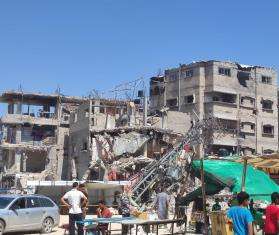Brussels, September 8, 2006 — During the spring of 2004, five Doctors Without Borders/Médecins Sans Frontières (MSF) staff members were killed as they returned to their base after working at a rural health clinic in northern Afghanistan.
Brussels — During the spring of 2004, five Doctors Without Borders/Médecins Sans Frontières (MSF) staff members were killed as they returned to their base after working at a rural health clinic in northern Afghanistan.
In response, MSF stopped all its activities, withdrew from the country, and asked the Afghan authorities to conduct a proper investigation into the killings. In the immediate aftermath little happened, but after repeated calls from the victims' families and from MSF, the Afghan government took more action.
Now a court in Kabul has acquitted two murder suspects, Abdul Latif and Shampaq, yet sentenced them to one and five years in prison respectively for "failing to prevent the killings." MSF does not understand the meaning of the sentence and fears that it could signal the end of the investigation.
MSF is disappointed by the verdict. The numerous glitches in the judicial process that have been revealed to us raise many questions about the case. It also casts doubt on the way the rest of the case may be handled in the future.
The main suspect, Hadji Yaqub, remains in custody awaiting further trial, but we still do not know about the motives behind the killings, which is causing us great frustration. To add to the confusion, MSF has learned that the reason for the delay in bringing Yaqub's case to trial is because his file has been lost.
This case raises serious concerns about security and respect for humanitarian workers in Afghanistan. MSF expects the government to protect civilians, such as humanitarian aid workers and the Afghan population, to the best of its ability. This includes preventative as well as judicial measures.
MSF continues to monitor the situation in Afghanistan and is aware that there are still humanitarian needs in many parts of the country. However, resuming activities is entirely dependent on both needs and security assessments. For the moment, security conditions make it impossible for MSF to even consider conducting exploratory missions.
MSF will continue to follow closely the judicial process in the hope that justice will be done for its five murdered staff members.
MSF also wishes to take this opportunity to express its solidarity with the families of these employees: Hélène de Beir, Pim Kwint, Egil Tynaes, Fasil Ahmad and Besmillah.



